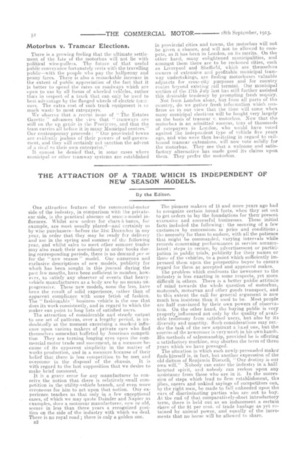THE ATTRACTION OF A TRADE WHICH IS INDEPENDENT OF NEW SEASON MODELS.
Page 2

If you've noticed an error in this article please click here to report it so we can fix it.
By the Editor.
One attractive feature of the commercial-motor side of the industry, in comparison with the privatecar side, is the practical absence of seasca-model influences. Whilst new orders for chars-i), banes, for example, are most usually placed—and certainly so by wise purchasers—before the 31st December in any year, in order that they may be ready for deliveiy and use in the spring and summer of the following year, and whilst sales to meet other summer trades may also reach their ascendancy in order books during corresponding periods, there is no demand per se for the "new season " model. Our numerous and exclusive descriptions of new models, publicity for which has been, sought in this journal during the past few months, have been sufficient in number, however, to satisfy any observer of events that heavyvehicle manufacturers as a body are by no means unprogressive. These new models, none the less, have been the result of solid experience, rather than of apparent compliance with some fetish of fashion. The " fashionable " business vehicle is the one that does its work consistently, and in regard to which the maker can point to long lists of satisfied users.
The attraction of considerable and steady output to one set of patterns, over a lengthy period, is undoubtedly at the moment exercising a marked influence upon various makers of private ears who find themselves somewhat buffeted by American competitionThey are turning longing eyes upon the commercial-motor trade and movement, in a measure because of its apparent simplicity in the matter of works production, and in a measure because of their belief that there is less competition to be met and overcome in the disposal of the chassis. It is with regard to the last supposition that we desire to make brief comment
It is a grave error for any manufacturer to conceive the notion that there is relatively-small competition in the utility-vehicle branch, and even more erroneous for him to act upon that notion. Our experience teaches us that only in a few exceptional cases, of which we may quote Daimler and Napier as examples, does a motorcar manufacturer, new or old, secure in less than three years a recognized position on the side of the industry with which we deal. There is no royal road; there is only a golden one.
B2 The pioneer makers of 15 and more years ago had to recognize certain broad facts, when they set out to get orders to lay the foundations for their present extensive and successful businesses. These initial facts included the following : the securing of a few customers by concessions in price arid conditions ; the necessity for them to endure, with all the patience that might be commanded, varying intervals while records concerning performances in service accumulated ; steps to secure, by advertisement or participation in public trials, publicity for their names or those of the vehicles, to a point which sufficiently impressed them upon the prospective buyer to ensuro regard for them as accepted and approved makes.
The problem which confronts the newcomer to the industry is less exacting in some respects, yet more difficult in others. There is a better public attitude of mind towards the whole question of motorbus, motoreab, motorvan and other goods transport, and to this extent the call for general argument is now much less insistent than it used to be. Most-people are half convinced by their own powers of cabserva, tion. On the other hand, the buying public is very properly influenced not only by the quality of available testimony from satisfied users, but also by its diversity and quantity. Such considerations may render the task of the new aspirant a hald one, but the success of the newcomer is verymueh in his own bands. His methods of salesmanship, provided he is offering a satisfactory machine, may shorten the term of three years which we have presaged.
The situation in which each newly-persuaded maker finds himself is, in fact, but another expression of the old dictum of Benjamin Disraeli, " Our destiny is our own will." Nobody can enter the industry in a halt hearted spirit, and nobody can reckon upon any assistance front those who are in it. In the succession of steps which lead to firm establishment, the jibes, sneers and unkind sayings of competitors can, by the right men, be made to fall unheeded upon the ears of discriminating parties who are out to buy. At the end of that comparatively-short introductory term, there is held out as an inducement a certain share of the 91 per cent. of trade haulage as yet retained by animal power, and equally of the increments that no horse. will be allowed to share.






















